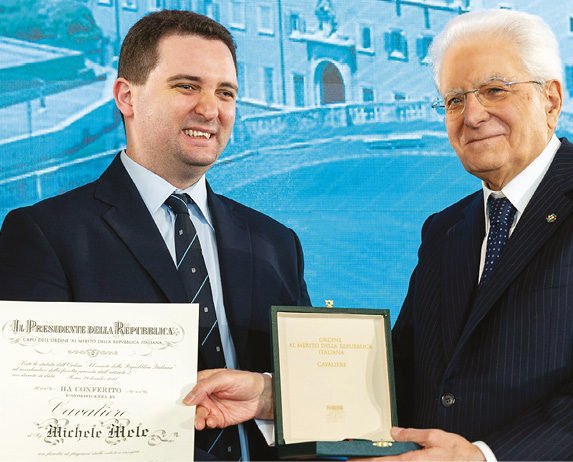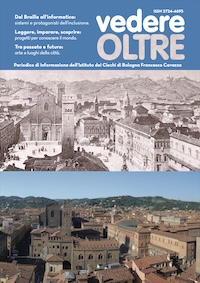Michele Mele is really good with numbers. After earning a Teaching Degree in Mathematics from the University of Salerno and a PhD in Mathematics and Computer Science at the “Federico II” University of Naples, he’s doing research on Combinatorial Optimization and on topics regarding the history and teaching of mathematics at the University of Sannio in Benevento. He’s also Education Officer of the “Science in Braille” campaign sponsored by the United Nations and by the Royal Academy of Science International Trust in London, and coordinator of the Italian Touring Club’s “Accessibility to Art” project, which he created.
He's also the author of two books, “L’universo tra le dita” and “Il richiamo della strada” (Edizioni Efesto), and collaborates with international newspapers. Not bad for a 33-year-old born with hereditary macular degeneration, who, for his scientific activities on behalf of people with eye disorders, has received the Order of Merit of the Italian Republic from President Sergio Mattarella.
Mathematics is a language created to interpret reality. You’ve loved it since you were a child. How can we convince young people to love it?
As a young child, I had to learn to geometrize the space around me due to my disorder. Young people shouldn’t be given a series of formulas to memorize – that’s not math. Instead, the deeper meaning of the discipline should be explained, both methodological and practical. Mathematics is the science that explains our life, democracy, and the universe, but it’s also the most effective tool for facing daily challenges.
How can we build a more inclusive society?
It’s up to all of us, with no exclusions, to start from respect for the most basic rules of civilization, a requisite of every society that wants to call itself human. Only culture, understood not as a superficial cult of ashes, but as respect for others, can create the right presuppositions for processes of inclusion and make us all truly free.
How much did your diversity weigh on your growth?
Italian society, as opposed to others, tends to label anyone who’s different, whatever their “deformity” from “normality” may be. But being accepted by society mustn’t corrupt the individual, who, after accepting their diversity, has to follow their own path, not caring about the barriers built by ignorance. The key to overcoming every form of discrimination is to avoid self-pity and victimism, to learn from being wronged in order to be stronger and swifter after every fall.
In addition to artificial intelligence, what scientific advances can we hope for to improve the future?
The conservative and antiscientific mentality here in Italy immediately raised a storm of alarmism and evident lies about AI, but it remains our number one hope, at least in the near future. Beyond the profound renewal of assistive technologies about to take place thanks to AI, logistics and teaching linked to accessibility are more frequent topics of scientific research, so I’m optimistic about the future. From accessibility to the reading of formulas and foreign languages to inclusivity of public transportation systems, the possibilities are vast, and the next few years may really hold some surprises. But this will happen only if trust in science is the basis of every policy and a common factor in our culture.





.png)